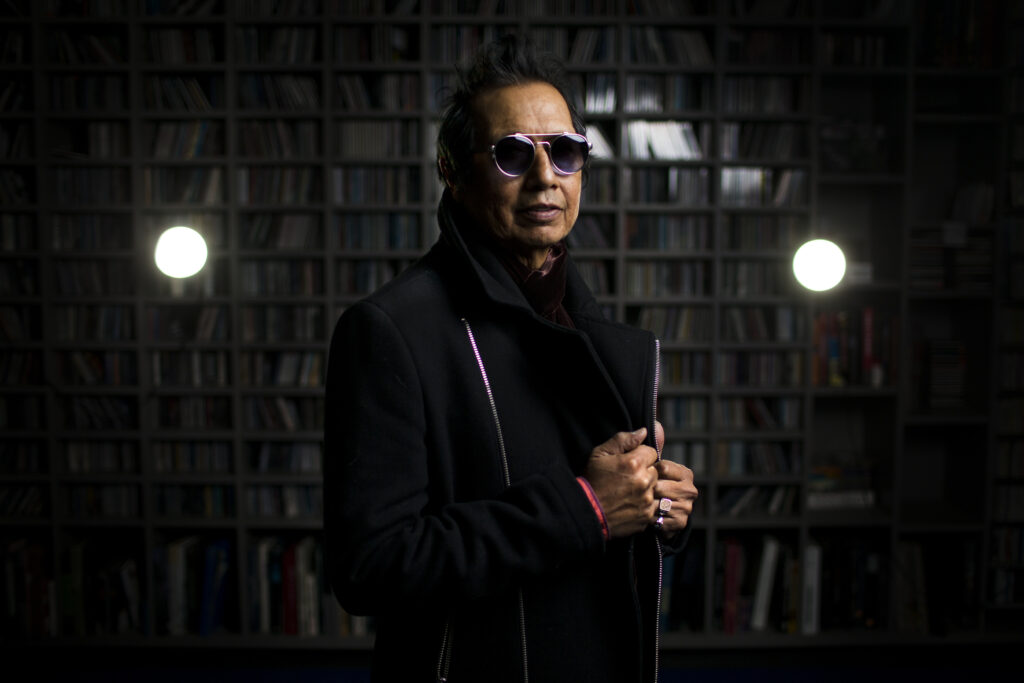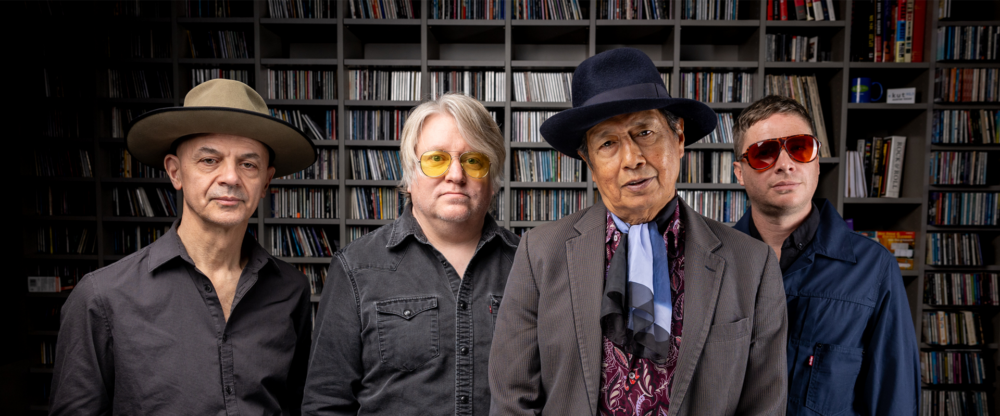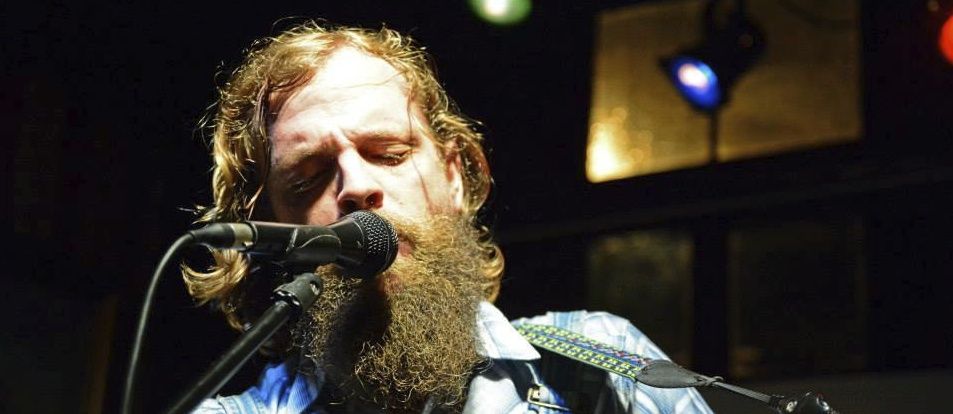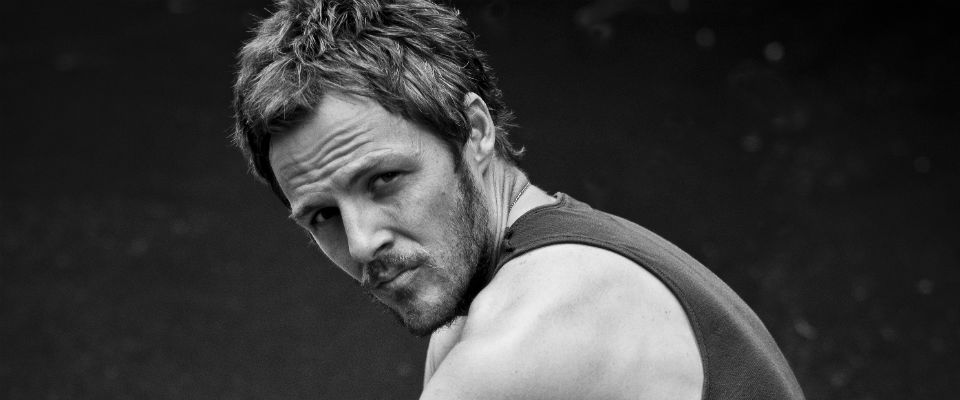With Echo Dancing, He Reinvents His Past
Who says there are no second chances?
Alejandro Escovedo’s new album, Echo Dancing, is an outlier in his long discography. It’s a do-over, a remake, a look over your shoulder at all the baggage you trail behind.
There have been plenty of greatest hits compilations. And many artists have re-recorded their songs in an attempt to get rights to their material. Echo Dancing (released 3/29 and celebrated with his Studio 1a performance) isn’t really either of these things. It’s a re-framing, an old photograph seen in an entirely new light.
It’s easy to understand Escovedo’s temptation. His life and career, even before he arrived in Austin in 1980, is full of the narrative drama of a novel (and maybe someday we’ll get one). Since arriving here he has become an inseparable part of this city’s legend.
Born into a large, musical family in San Antonio, his father soon swept them out west. Alejandro had shown only marginal musical interest. He wanted to be a surfer, and spent his years haunting the beaches and record stores of Southern California. An interest in film led him to stage a Bay Area mockumentary about ‘the worst band in the world’. But he and the rest of the Nuns soon discovered they loved performing. From there came a plunge into New York City bohemia, playing with Judy Nylon, staying up with the ghosts in the Chelsea Hotel. When Chip and Tony Kinman recruited him for their cowpunk venture, Rank and File, their long journey eventually led to Austin. Settling into the city, Alejandro had still not written a single song.
“I wasn’t an educated kid,” he explained. “I wanted to go out and live my life. But when I came to Austin, I was close to some of the greatest songwriters in the world. You know, Townes was here, Joe Ely, guys like Jubal Clark and Rich Minus were here – characters that you’ll never find anywhere else in the world. Pat Mears, Lucinda was busking on the drag. My education really began here, in a sense, as far as songwriting is concerned.”
It’s the middle of a busy SXSW, and I’m interviewing Alejandro for a public preview of Echo Dancing at the Continental Club Gallery, recounting the forty years we have known each other, recalling his early Austin days. That first song he wrote, “The Rain Won’t Help You When It’s Over”, became a staple of the triple-threat guitar army he assembled with his brother Javier and Jon Dee Graham, the True Believers. The Believers’ Velvets/Iggy swagger ruled the shimmery New Sincerity scene of late eighties. They seemed poised to break big. Instead, EMI shelved their second album and everything splintered.
This pattern of highs and lows, successes and setbacks, would persist. Ignoring a Hep C diagnosis brought Alejandro near death in 2003. After slowly getting back on his feet, he would sign with Jon Landau’s management, appear on stage with Bruce Springsteen, then barely survive a Category 4 hurricane in Baja California on he and wife Nancy’s honeymoon. He subsequently developed a form of PTSD, was forced to cancel a tour and suffered another career lull, until his triumphant 2018 release The Crossing put him in the limelight all over again. That was six years ago.

“I was going to record again in Italy,” Alejandro recalls. “I knew I wanted to make a record with just Nicolo [Peruch], who played keyboards, and Don Antonio, who played guitar and was the bandleader of The Crossing. I was going to make a record that was completely improvised from the first note. I had sketches of lyrics, some ideas musically, but I didn’t have 15 songs, not even close. As I was starting to get inspired, I listened to older material. And I came across a version of “Wave” by Calexico. They did it for Por Vida (the benefit tribute album released to help Alejandro with his Hep C medical bills). It was amazing. They reconstructed the song, with ideas that I would never have thought of. It was just so cool. When you write a song, a lot of times you get married to the arrangement and vocal delivery. The whole structure of the song is cemented somehow. I wanted to break it down completely. So I started to listen to other versions of songs from Por Vida, especially John Cale’s version of “She Doesn’t Live Here Anymore”. I thought, this is a cool idea, because I had never really done a greatest hits. I think “Wave” was the first song we recorded. We found this beautiful pocket, this beautiful place to present the song. And that really kind of reassured me that whatever we’re going to do is going to work.”
“Wave” is one of Alejandro’s most elegiac works, and the new arrangement plays up the simultaneous acknowledgement of grief and anger, his father’s passing and his inability to rise above systemic racism.
“My dad was a great storyteller. The characters always change, you weren’t sure what was true. He was raised by his grandmother and left at an early age to go find his parents. I was fascinated by that kind of a sense of freedom. I was born in San Antonio in 1951, surrounded by family. Everything was Mexican. It was family. And suddenly in 1957, we went to California under the impression that we were going on a vacation and we never return. Now we’re in Orange County. Even though in California, it was very racist. We were never called the names beaner or wetback until we moved to California.”
“I always felt that it was important to tell my dad’s story because it’s a universal story, right? We’re all immigrants from somewhere, and a lot of people don’t know about that kind of underlying prejudice that exists in education, in social places. I remember once going to Disneyland because you could see great bands there. Here I am, taking a day to stand in line. These two big surfer guys are standing in front of me. And I said, you know, just trying to be cool, ‘You guys know what time it is?’ ‘Tijuana time?’, they answered. So subtle. Crippling when you’re trying to impress a young girl. I always thought it was extremely important to educate my children, people around me about what life really was like for us. And my dad personified it more than anyone does. Here was a man who left home when he was a young boy, worked hard all his life. He raised a bunch of kids. Out of those 12 children, I think at least six professional musicians who’ve gone around the world and spread love and peace with people.”
“Don’t you cry /
We made it to the other side /
The sun’s not brighter here /
It only shines on golden hair /
I went north, I went south /
Maybe east, some left out /
Some are rich, some are poor /
But everybody’s got to wave”
“We’re headed for the sun in this golden opportunity,” Alejandro says. “But it doesn’t shine on us.”
Like the best cover versions, the new arrangements of Echo Dancing illuminate new corners, from the hilarious put-down of Buick MacKane-hating critic “John Conquest”, to the hard-scrabble Bay Area imagery of “Sacramento & Polk” (“The neighbors spend their days washing their socks / And staring out the window in a Thorazine haze”). to the album’s most radical reinvention, a metronomic dub-cumbia crawl on what is probably Escovedo’s best known song, “Castanets”, renamed “Castañuelas”.
I ask Alejandro if the new version was a response of having to play the original so often, a song he once swore he would never play again when it ended up on George W. Bush’s iPod.
“I do get sick of songs, but this is not one of them. I have fun playing this, it’s very guitar oriented, and I always loved Mott the Hoople, it reminds me of that period of Bowie, Ronson, you know, Mick Ralphs. We broke it way down. That’s the beauty of improvising, right? You have no sketch, really. Let’s just start.”
Echo’s selections cover a wide swath of his career, there’s a new version of the song that perfectly captures the yin/yang of his rock star/imposter syndrome personality: “Everybody loves me,” he boasts, “but I don’t know why.” There’s even a song from the lost second True Believers album. And of course, a couple of tracks from Escovedo’s 1992 solo debut, Gravity. This lyrical work was the first real glimpse most of us had of where Alejandro was taking us next.
Yet it came at a particularly fraught time. Adrift after the Believers breakup, Alejandro was trying to keep his projects the Alejandro Escovedo Orchestra and Buick MacKane afloat while working day jobs. His longtime partner and confidant Bobbi had tragically taken her own life, and his grief permeated the record.
“Bury Me” comes from this time, a macabre tale somehow given even more foreboding on Echo.
“It was a dark period,” Alejandro confesses. It was really hard. The songs that were coming out were hard to write, hard to sing. When someone that is so close to you takes their own life, it’s that kind of ‘I wish it was me instead of them.’”
“If I should die ‘fore I turn 51 /
Bury me with a loaded gun /
So I might lose my misery /
Please erase my memory”
“I’ll tell you one cool thing about that song. It was presented to Johnny Cash when he was going to do the Rick Rubin records, and it actually made it through a second or third audition. It didn’t make the album, but I was just so happy that he probably sang it at one time.”

It’s this combination of the ink black and the unbridled joy, the quiet poet and the devilish rocker, that have for decades suffused Alejandro’s music with so much raw emotion. Echo Dancing proves the perfect distillation.
Alejandro left on a long tour on April 1st. He won’t return until mid-May, then has plenty of fall dates (including a Canadian jaunt with Jason Isbell) to keep him busy the rest of the year. If you’ve done the math, you know that Alejandro is no longer a young man. Yet at 73, he somehow seems more vibrant and excited than he has in years.
After convalescing in Dallas for a few years, he and Nancy have settled into a hill country home. They seem happy to be back in the Austin area, with health scares like Hep C and PTSD behind them.
The night of our interview, my wife and I jam into a shoulder-to-shoulder crowd outdoors at C-Boy’s to watch Alejandro take the stage yet again. If he’s the slightest bit tired from the SXSW frenzy, you’d never know it. Within moments, the band is building its fever pitch. “Come on!”, he goads them, and they find another gear. In command, he was born for this, he’s spent his life up there, and looking around at the rapturous crowd, there’s no reason to believe he can’t keep on going forever.
Artist: Alejandro Escovedo
Date: 3.28.24
Set List:
“John Conquest”
“Bury Me”
“Sacramento & Polk”
“Outside Your Door”
“Dearhead on the Wall”
Album: Echo Dancing (Yep Rock LLC 2024)
Musicians: Mark Henne – drums; Scott Danbom – keyboards; James Mastro – guitar; Alejandro Escovedo – guitar, vocals
Credits:
Producer: Deidre Gott; Production Assistant: Confucius Jones; Audio Engineer: Jake Perlman, Rene Chavez; Audio Mix: Rene Chavez; Cameras: Renee Dominguez, Michael Minasi; Edit: Renee Dominguez; Host: Jody Denberg



